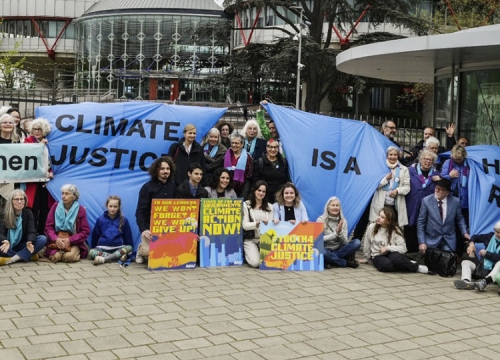KlimaSeniorinnen vs. Switzerland: Relevance for UN human rights mechanisms
Human Rights Conversations


CIEL
On 9th April 2024, the European Court of Human Rights delivered a groundbreaking decision with respect to human rights protection in the context of climate change. In Verein KlimaSeniorinnen Schweiz and Others v Switzerland, the Court found that states have an obligation to mitigate climate change under article 8 of the European Convention of Human Rights, which protects the right to respect for private and family life. The Court found that Switzerland, by failing to implement sufficient measures to combat climate change, violated the Convention.
As the issue of the interrelation between climate change and human rights becomes more and more important, this decision will bear significant implications in advancing climate justice litigation at the international, regional and domestic law levels. As also recognized by the European Court of Human Rights, there is now a convergence between different human rights bodies, including UN Special Rapporteurs, that the question is no longer whether, but how, human rights courts should address the impacts of environmental harms on the enjoyment of human rights.
This Human Rights Conversation, co-organized with the Center for International Environmental Law (CIEL), aims at exploring the significance of this ruling by the European Court of Human Rights and assess how other human rights bodies can draw from this decision and further strengthen the interrelation between human rights and climate change and clarify the legal obligations of states in protecting human rights from environmental harm.
In particular, the discussion will explore the meaning and impact of regional human rights systems’ decisions for the debate at the UN level. On 5 April 2024, the Human Rights Council appointed Elisa Morgera as new mandate holder for the post of Special Rapporteur on Climate Change. The conversation between her and a representative of KlimaSeniorinnen Switzerland, will highlight the links between national, regional and international work in a concrete setting.
Moderation
Felix Kirchmeier
Executive Director, Geneva Human Rights Platform
Speakers
Elisa Morgera
UN Special Rapporteur on the promotion and protection of human rights in the context of climate change
Anne Mahrer
Co-president, KlimaSeniorinnen Switzerland
Nahla Haidar
Member of the UN Committee on the Elimination of Discrimination Against Women (CEDAW)
Francesca Mingrone
Staff Attorney, Center for International Environmental Law
About Human Rights Conversations
Human Rights Conversations are a series of events, hosted by the Geneva Human Rights Platform, aimed at discussing contemporary issues and challenges related to the promotion and protection of human rights in Geneva and beyond.
Disclaimer
This event may be filmed, recorded and/or photographed on behalf of the Geneva Academy. The Geneva Academy may use these recordings and photographs for internal and external communications for information, teaching and research purposes, and/or promotion and illustration through its various media channels (website, social media, newsletters, annual report, etc.).
By participating in this event, you are agreeing to the possibility of appearing in the aforementioned films, recordings and photographs, and their subsequent use by the Geneva Academy.







